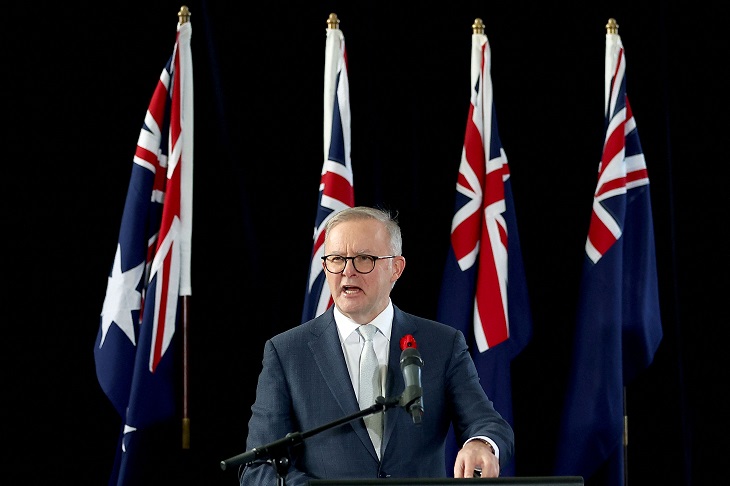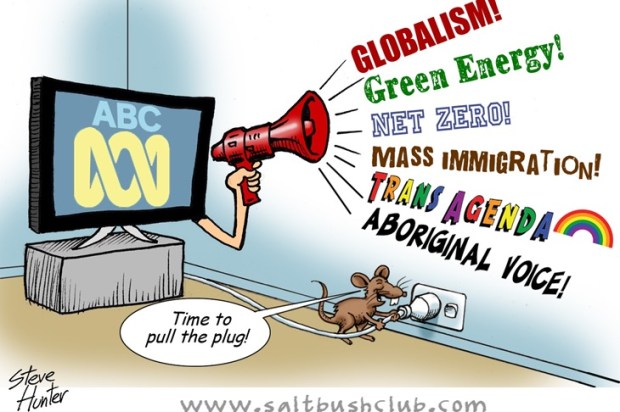The management of Covid by the Australian authorities has shown that the emergence of tyranny, with its suppression of free speech, is never far removed from reality. The horrendous violations of people’s rights during the pandemic have revealed the existence of an invidious trend of authoritarianism in Australia.
A good example of this trend is the sponsoring by both major parties of a proposed law that, if implemented, will dramatically curtail freedom of speech in Australia. Specifically, the Communications Legislation Amendment (Combating Misinformation and Disinformation) Bill 2023 foreshadows the imposition of an obligation on digital platforms to police ‘misinformation’ and ‘disinformation’.
This imposition involves a two-pronged approach: the digital platforms are expected to adopt a code of conduct, violation of which will see them censor speech deemed to constitute ‘misinformation’ or ‘disinformation’. If that does not work, the bill provides for the empowerment of the Australian Communications and Media Authority (‘ACMA’) to directly intervene for the purpose of preventing ‘harm’.
Section 2 of the bill defines ‘harm’ as follows:
(a) hatred against a group in Australian society on the basis of ethnicity, nationality, race, gender, sexual orientation, age, religion or physical or mental disability;
(b) disruption of public order or society in Australia;
(c) harm to the integrity of Australian democratic processes or of Commonwealth, State, Territory or local government institutions;
(d) harm to the health of Australians;
(e) harm to the Australian environment;
(f) economic or financial harm to Australians, the Australian economy or a sector of the Australian economy.
In other words, the concept of ‘harm’ is a flexible and accordion-like concept that potentially encompasses any type of speech that ACMA deems to be ‘harmful’. As such, the concept has malleable content that expands and contracts depending on ACMA’s prevailing views.
ACMA’s enforcement of the legislation will inevitably stymie discussion of controversial topics, especially if they involve criticism of government policy and actions. The proposed legislation is a direct attack on the rights of Australians to free speech because digital platforms will be obliged to police commentators’ discussion of controversial topics.
Predictably, this scenario is likely to unfold when the impugned speech is incompatible with the government’s narrative. Thus, the proposed legislation targets those who, merely exercising their right to free speech, critically assess government decisions and actions.
For example, the legislation could be used to silence any opposition to the Voice amendment proposal to the Constitution, or to minimise any criticism of the government’s handling of the Covid pandemic, or even the expression of scepticism about the government’s zero transmissions fantasy.
This is about silencing the opinion of anyone who dares to question the desirability of any governmental policy. The enforcement of the proposed legislation would effectively drive dissenting views underground. Such enforcement itself is likely to generate harm because the banishment of views from the public forum will, inevitably, adversely affect, even diminish, people’s free speech rights.
It is ironic that views incompatible with the government’s preferred narrative could be deemed to ‘harm’ the integrity of Australia’s democracy since it would disallow speech and expressive conduct that is integral to the maintenance of democratic processes. Indeed, a healthy democracy is always dependent on the free flow of ideas, even if a government agency describes them as ‘misinformation’ or ‘disinformation’.
Naturally, the ruling classes may have a vested interest in preserving the dominant orthodoxy by controlling the public narrative and suppressing any speech that might threaten their hegemonic discourse. As such, the proposed legal provisions constitute an imminent threat to the communications and livelihoods of human rights defenders and investigative journalists.
While doing so, the proposed law goes in direct opposition to the advice of international human rights experts that ‘general prohibitions on the dissemination of information based on vague and ambiguous ideas, including ‘false news’ or ‘non-objective information’, ‘are incompatible with international standards for restrictions on freedom of expression … and should be abolished’.
Indeed, the proposed legislation might potentially, if not actually, silence the opinion of anyone who dares to question the desirability of any governmental policy. The relentless promotion of Covid vaccines and the imposition of vaccine mandates provide excellent examples of the silencing of free speech during the pandemic when Australian governments, assisted by their ‘health experts’, flirted with authoritarianism.
Many Australians are now starting to find out that ‘health experts’ handpicked by the Australian government miserably failed to raise enough concerns about the lack of efficacy and dangerous side effects of mRNA vaccines. The official government narrative about the safety of vaccines was based on research conducted by pharmaceutical companies selling these experimental vaccines.
At the beginning of the vaccination rollout on February 21, 2021, the Australian government collaborated with social media companies to censor anyone who dared to question the safety of vaccines, including doctors who disagreed with official health information.
The ‘muzzling’ of doctors’ free speech constituted an egregious attack on medical speech. The deregistration of doctors who provided vaccine exemptions or prescribed ivermectin to treat Covid was routinely used as a punishment. Emeritus Professor Robert Clancy AM, a clinical immunologist, lamented the fact that, despite patients showing ‘impressive results’ when treated with ivermectin or hydroxychloroquine, the Therapeutic Goods Administration (‘TGA’) prohibited their prescription.
Freedom of information documents acquired by Senator Alex Antic reveals that the government, under domestic terrorism response protocols, treated any concern regarding the safety of mRNA vaccines as domestic terrorism. The information reveals that from 2017 to 2022, the Australian Department of Home Affairs petitioned social media sites to censor information 13,646 times. This included ‘suppressed Covid posts from doctors who disagreed with official public health and vaccine information’.
If the proposed ‘misinformation’ and ‘disinformation’ legislation is adopted and the free expression of ideas is curtailed, these ideas are likely to go underground where they will fester and infect, only to explode when society has become so brittle that any robustness cannot develop.
A robust society is one where ideas of all kinds, even obnoxious ones, can be debated with impunity in the public forum. The concept of ‘harm’, peddled by the bill, is an illusory concept, the content of which would be subjectively determined by a powerful government agency.
Although ACMA will likely develop guidelines for the purpose of clarifying the concept, they may well reflect the left-wing bias of the world in which we live. It is a world where government, increasingly, seeks to wield power over the individual. In this context, it is useful to remember the words of John Stuart Mill, the 19th Century philosopher and politician, who wrote in his celebrated essay On Liberty:
… there is also in the world at large an increasing inclination to stretch unduly the powers of society over the individual, both by the force of opinion and even by that of legislation; and as the tendency of all the changes taking place in the world is to strengthen society, and diminish the power of the individual, this encroachment is not one of the evils which tend spontaneously to disappear, but, on the contrary, to grow more and more formidable. The disposition of mankind, whether as rulers or as fellow-citizens, to impose their own opinions and inclinations as a rule of conduct on others, is so energetically supported by some of the best and by some of the worst feelings incident to human nature, that it is hardly ever kept under restraint … and as the power is not declining, but growing, unless a strong barrier of moral conviction can be raised against the mischief, we must expect, in the present circumstances of the world, to see it increase.
Mill’s analysis also aptly describes the present world. He derides the sheep-like conformity, which enables rulers, policymakers, and trendsetters to impose their freedom-unfriendly views and arbitrary rules on people. He stresses the overriding importance of free speech: ‘The only freedom which deserves the name, is that of pursuing our own good in our own way, so long as we do not attempt to deprive others of theirs, or impede their efforts to obtain it.’
Mill signals that it is imprudent to allow a bunch of government apparatchiks to decide what is harmful, especially if they are allocated a wide, uncontrolled power capable of silencing any dissent in society. In any event, it could be argued that even ‘misinformation’ and ‘disinformation’ are healthy for society because they might encourage vigorous debate to rectify that information.
It is noteworthy that the government is exempted from the legislation. Hence, the content issued by the government cannot be considered ‘misinformation’ under the law proposal, but criticisms of the government by ordinary citizens can. As a consequence, the proposed law, if adopted, would no longer be a general law that is applicable to all Australians: that, in itself, is an egregious violation of the ‘rule of law’.
The conclusion is that freedom of speech is under threat in Australia, and it behoves on all those who value freedom to oppose this spectacular power grab by the government to control individuals.
Indeed, the proposed legislation will generate a hostile digital environment by imposing burdensome obligations on Internet providers, encourage censorship, and seriously affect the online expression of ideas through surveillance and the random criminalisation of public discourse. The danger here, warns Lorraine Finlay, the Australian Human Rights Commissioner, ‘…is that efforts to combat misinformation and disinformation could be used to legitimise attempts to restrict public debate and censor unpopular opinions.’
Similarly, in its 12-page submission to the Law Council, the Victorian Bar argues that ‘the bill’s interference with the self-fulfilment of free expression will occur primarily by the chilling self-censorship it will inevitably bring about in the individual users of the relevant services.’
In this sense, the proposed ‘misinformation’ legislation undermines the implied freedom of political communication derived from the Australian Constitution. Under our Constitution, sovereignty ultimately resides not in members of Parliament but in the Australian people who shall preserve their free speech by protecting their ability to hold the government accountable.
If Australians as a people are truly sovereign, it is wrong therefore to assert that their politicians should have more speech rights than the people who elected them to represent them in Parliament.
If anything, the concept of popular sovereignty implies a freedom to speak even the most unspeakable things.1 However, the horrendous violations of fundamental rights envisaged on the Australian people especially over the last few years reveals the existence of an invidious trend towards authoritarianism in this country. We are witnessing our system of representative government to gradually become nothing but a less open or more disguised form of elective dictatorship.
Of course, a perfect example of this trend towards elective dictatorship is this deceptively entitled Misinformation and Disinformation Bill introduced by the Albanese government. However, the text and structure of the Constitution, and particularly its system of democratic government, gives rise to an implication that there must be the freedom for citizens to discuss any political matter.
By taking away people’s freedom of political communication, the Misinformation and Disinformation Bill is constitutionally invalid, and Australians must demand that their politicians reject such an appalling law proposal.
Augusto Zimmermann is professor and head of law at Sheridan Institute of Higher Education and served as associate dean at Murdoch University. He is also a former commissioner with the Law Reform Commission of Western Australia.
Gabriël A. Moens AM is an emeritus professor of law at the University of Queensland, and served as pro vice-chancellor and dean at Murdoch University.
Professors Zimmermann and Moens are the authors of ‘Foundations of the Australian Legal System: History, Theory and Practice’ (LexisNexis, 2023).
1.Australian Capital Television Pty Ltd v Commonwealth (1992) 177 CLR 106, 137–8 (Mason CJ) (‘ACTV’).
Got something to add? Join the discussion and comment below.
Get 10 issues for just $10
Subscribe to The Spectator Australia today for the next 10 magazine issues, plus full online access, for just $10.


























Comments
Don't miss out
Join the conversation with other Spectator Australia readers. Subscribe to leave a comment.
SUBSCRIBEAlready a subscriber? Log in